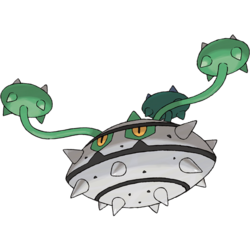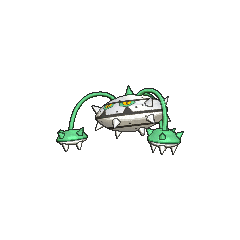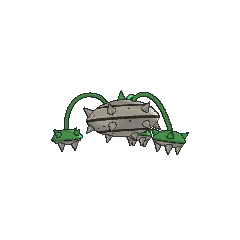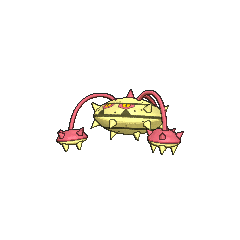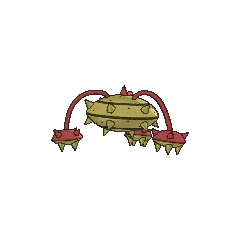From Bulbapedia, the community-driven Pokémon encyclopedia.
|
|
| Line 39: |
Line 39: |
| |friendship=70 | | |friendship=70 |
| }} | | }} |
| '''Ferrothorn''' ([[List of Japanese Pokémon names|Japanese]]: '''ナットレイ''' ''Nutrey'') is a dual-type {{2t|Grass|Steel}} Pokémon. | | '''Ferrothorn''' ([[List of Japanese Pokémon names|Japanese]]: '''ナットレイ''' ''Nutrey'') is a dual-type {{2t|Grass|Steel}} {{OBP|Pokémon|species}} introduced in [[Generation V]]. |
|
| |
|
| It [[Evolution|evolves]] from {{p|Ferroseed}} starting at [[level]] 40. | | It [[Evolution|evolves]] from {{p|Ferroseed}} starting at [[level]] 40. |
Revision as of 07:06, 8 January 2017
Ferrothorn (Japanese: ナットレイ Nutrey) is a dual-type Grass/Steel Pokémon introduced in Generation V.
It evolves from Ferroseed starting at level 40.
Biology
Ferrothorn is a Pokémon resembling a flattened durian. Its metallic body is covered in thorns, with three black stripes circling its width, the middle stripe having triangular decorations below the eyes of Ferrothorn. Its eyes have green rims, yellow scleras, and dark pupils. There is a green spike at the top of its body, and extending around it are vine-like, long green appendages tipped with spiky metal disks. It can use these appendages to either cling to ceilings of its cave or walk around. When hanging, it can attack its prey underneath by shooting spikes.
In the anime
Major appearances
Ferrothorn made its anime debut in Iris and the Rogue Dragonite! under the ownership of Officer Jenny.
Cameron was revealed to own a Ferrothorn in The Road to Humilau!.
Minor appearances
A Ferrothorn appeared in the ending credits in Eevee & Friends.
In the manga
In the Black & White arc, a Ferrothorn was seen under the ownership of a Hoopster, who was one of the 32 qualified participants in the Unova Pokémon League.
In the TCG
- Main article: Ferrothorn (TCG)
Game data
Pokédex entries
| This Pokémon was unavailable prior to Generation V.
|
| Generation V
|
|
| Black
|
It fights by swinging around its three spiky feelers. A hit from these steel spikes can reduce a boulder to rubble.
|
| White
|
They attach themselves to cave ceilings, firing steel spikes at targets passing beneath them.
|
| Black 2
|
By swinging around its three spiky feels and shooting spikes, it can obliterate an opponent.
|
| White 2
|
|
|
| Generation VI
|
|
| X
|
By swinging around its three spiky feelers and shooting spikes, it can obliterate an opponent.
|
| Y
|
They attach themselves to cave ceilings, firing steel spikes at targets passing beneath them.
|
| Omega Ruby
|
By swinging around its three spiky feelers and shooting spikes, it can obliterate an opponent.
|
| Alpha Sapphire
|
They attach themselves to cave ceilings, firing steel spikes at targets passing beneath them.
|
|
|
Game locations
| This Pokémon was unavailable prior to Generation V.
|
|
|
|
|
In side games
| This Pokémon was unavailable prior to Generation V.
|
|
|
|
|
Stats
Base stats
| Stat
|
Range
|
| At Lv. 50
|
At Lv. 100
|
74
|
|
134 - 181
|
258 - 352
|
94
|
|
89 - 160
|
173 - 315
|
131
|
|
122 - 201
|
240 - 397
|
54
|
|
53 - 116
|
101 - 227
|
116
|
|
108 - 184
|
213 - 364
|
20
|
|
22 - 79
|
40 - 152
|
Total: 489
|
Other Pokémon with this total
|
- Minimum stats are calculated with 0 EVs, IVs of 0, and (if applicable) a hindering nature.
- Maximum stats are calculated with 252 EVs, IVs of 31, and (if applicable) a helpful nature.
|
Type effectiveness
| Under normal battle conditions in Generation IX, this Pokémon is:
|
|
|
|
|
|
|
|
|
|
|
|
|
Learnset
|
|
|
|
- Bold indicates a move that gets STAB when used by Ferrothorn
- Italic indicates a move that gets STAB only when used by an Evolution of Ferrothorn
- Click on the generation numbers at the top to see level-up moves from other generations
|
|
|
|
|
- Bold indicates a move that gets STAB when used by Ferrothorn
- Italic indicates a move that gets STAB only when used by an Evolution of Ferrothorn
- Click on the generation numbers at the top to see TM moves from other generations
|
|
|
|
|
- Moves marked with an asterisk (*) must be chain bred onto Ferrothorn in Generation VII
- Moves marked with a double dagger (‡) can only be bred from a Pokémon who learned the move in an earlier generation.
- Moves marked with a superscript game abbreviation can only be bred onto Ferrothorn in that game.
- Bold indicates a move that gets STAB when used by Ferrothorn
- Italic indicates a move that gets STAB only when used by an Evolution of Ferrothorn
- Click on the generation numbers at the top to see Egg moves from other generations
|
|
|
|
|
- A black or white abbreviation in a colored box indicates that Ferrothorn can be tutored the move in that game
- A colored abbreviation in a white box indicates that Ferrothorn cannot be tutored the move in that game
- Bold indicates a move that gets STAB when used by Ferrothorn
- Italic indicates a move that gets STAB only when used by an Evolution of Ferrothorn
- Click on the generation numbers at the top to see Move Tutor moves from other generations
|
|
|
|
|
- Bold indicates a move that gets STAB when used by Ferrothorn
- Italic indicates a move that gets STAB only when used by an Evolution of Ferrothorn
- Click on the generation numbers at the top to see moves from other generations
|
Side game data
Evolution
Sprites
| This Pokémon was unavailable prior to Generation V.
|
|
|
|
|
Trivia
- No other Pokémon have the same Egg Group combination as Ferrothorn and its pre-evolved form.
- Ferrothorn is tied with Kartana for the highest Defense base stat of all Grass-type Pokémon.
- Ferrothorn is the only Pokémon with a base stat total of 489.
Origin
It appears to be based on durian plants. Its vines resemble military flails. The vines also resemble a fully-grown brier plant, just as its unevolved form resembles a seed. It could also be based on the tribulus, which is a species of thorny plants whose name, during Roman times, also meant caltrops, which is a thorny metallic weapon used to puncture the feet of invading soldiers. Also, the "tri-" in tribulus means "three", which is also the same number of pods Ferrothorn has.
Name origin
Ferrothorn is a combination of ferrum (Latin for iron) and thorn (a protective spine found on many plants).
Nutrey may be a combination of nut and rey (Spanish for king), 鈴 rei (bell), or trey (Italian for three anglicized, referring to its three appendages).
In other languages
| Language
|
Title
|
Meaning
|
 Japanese Japanese
|
ナットレイ Nutrey
|
From ナット natto and rey or 鈴 rei
|
 French French
|
Noacier
|
From noix and acier
|
 Spanish Spanish
|
Ferrothorn
|
Same as English name
|
 German German
|
Tentantel
|
From Tentakel and Hantel
|
 Italian Italian
|
Ferrothorn
|
Same as English name
|
 Korean Korean
|
너트령 Nutryung
|
From 너트 neoteu and 령(笭) ryeong
|
 Mandarin Chinese Mandarin Chinese
|
堅果啞鈴 / 坚果哑铃 Jiānguǒyǎlíng
|
From 堅果 jiānguǒ and 啞鈴 yǎlíng
|
 Cantonese Chinese Cantonese Chinese
|
|
|
|
|
|
| More languages
|
 Russian Russian
|
Ферроторн Ferrotorn
|
Transcription of English name
|
|
|
|
External links

|
This Pokémon article is part of Project Pokédex, a Bulbapedia project that aims to write comprehensive articles on each Pokémon species, as well as Pokémon groups and forms.
|


 For other sprites and images, please see Ferrothorn images on the Bulbagarden Archives.
For other sprites and images, please see Ferrothorn images on the Bulbagarden Archives.
